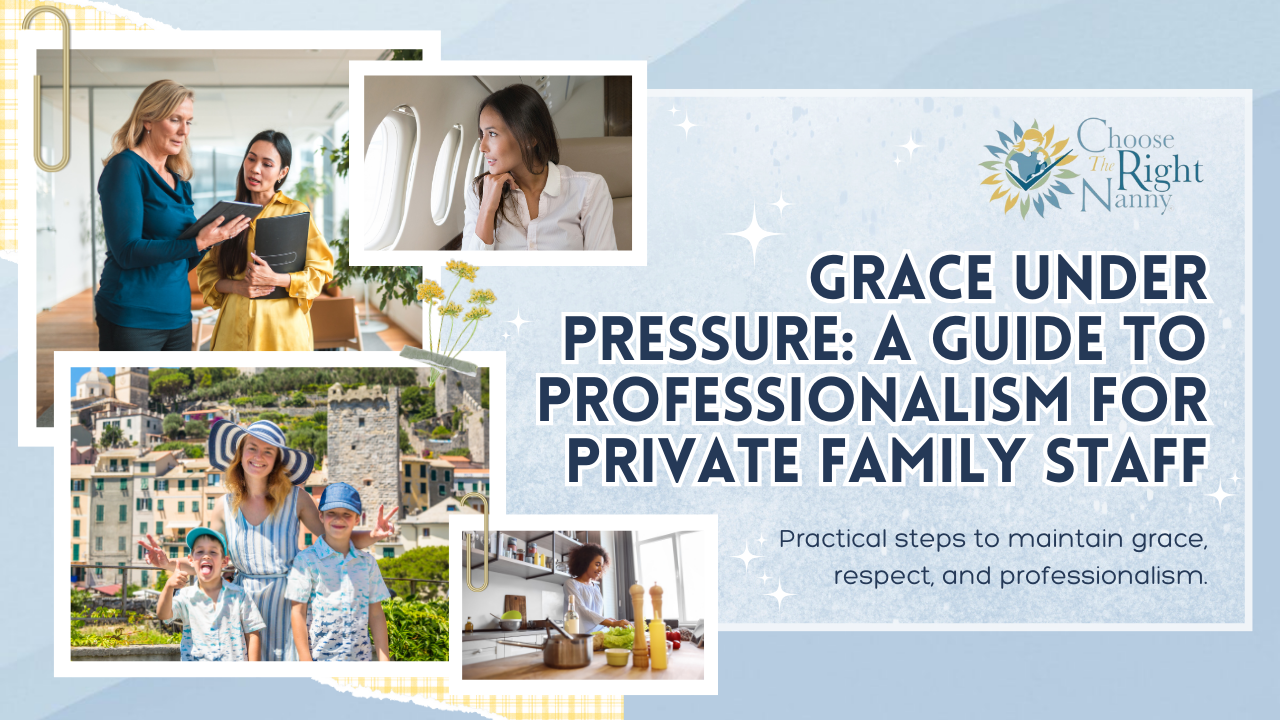As the owner of Choose The Right Nanny, I’ve spent years connecting exceptional household staff (nannies, family assistants, personal assistants, household managers, and housekeeping professionals) with families who value trust, discretion, and excellence.
In my experience, the most successful placements aren’t just about skills and qualifications; they’re built on a foundation of clear boundaries that protect both the staff and the family.
Today, I want to share some essential insights on navigating these boundaries to ensure a harmonious, professional relationship. Whether you’re new to the field or a seasoned pro, these guidelines can help you thrive while upholding the highest standards.
The Cornerstones of Professionalism: Maintaining Balance in Your Professional and Personal Life
Professionalism starts with understanding your role in supporting the family, not to become an extension of it in a personal sense. While building rapport is important, oversharing details about your own life can blur lines and create discomfort. For instance, discussing your personal relationships, financial struggles, or weekend adventures might seem harmless, but it can shift the dynamic from employer-employee to something more casual, which isn’t always appropriate.
Instead, focus on work-related communication. Share updates about the children’s activities, household needs, or task completions, but keep personal anecdotes minimal. This approach fosters respect and ensures the family feels confident in your ability to maintain a professional demeanor. Remember, your goal is to be reliable and efficient, not a confidant in non-work matters.
 Discretion and Confidentiality: The Bedrock of Trust
Discretion and Confidentiality: The Bedrock of Trust
In private family settings, discretion isn’t just polite, it’s non-negotiable. Families entrust you with intimate details of their lives, from daily routines to sensitive information about children, parents, extended family, finances, or medical conditions. Breaching confidentiality, even unintentionally, can irreparably damage trust and your professional reputation.
Never share family information with outsiders, whether in casual conversations, on social media, or in online forums. This includes posting photos of the children (even if anonymized), venting about family dynamics in group chats, or discussing household finances with friends. Always assume that anything you say, or post could circle back to the family. If you’re unsure about what constitutes private information, err on the side of caution and discuss it with your employer directly.
In today’s digital age, online discretion is particularly crucial. Avoid tagging locations near the family’s home, mentioning identifiable details in posts, or engaging in public discussions that could link back to your work. By prioritizing confidentiality, you not only protect the family but also safeguard your own career.
Responsible Credit Card Management: Handling Finances with Integrity
Many families provide household staff with a credit card for work-related expenses, such as groceries, children’s activities, or household supplies. This convenience comes with significant responsibility and mismanaging it can quickly erode trust.
First, clarify usage guidelines upfront. The card should only be used for approved, work-specific purchases, never for personal items like your lunch, gas for non-work errands, or gifts. If something falls into a gray area, seek approval before charging it. For example, if you’re picking up school supplies for the kids, that’s appropriate; buying a coffee for yourself during the errand is not, unless explicitly permitted.
 When traveling with the family, credit card usage requires extra diligence. The card may cover expenses like meals for the children, transportation for work-related tasks (e.g., airport transfers for the family), or supplies needed during the trip (e.g., sunscreen or activity materials). However, personal expenses during travel such as souvenirs, personal toiletries, or entertainment unrelated to your duties, should never be charged to the family’s card without their permission.
When traveling with the family, credit card usage requires extra diligence. The card may cover expenses like meals for the children, transportation for work-related tasks (e.g., airport transfers for the family), or supplies needed during the trip (e.g., sunscreen or activity materials). However, personal expenses during travel such as souvenirs, personal toiletries, or entertainment unrelated to your duties, should never be charged to the family’s card without their permission.
Tracking and reporting are equally important, whether at home or on the road. Keep all receipts organized (maybe in a dedicated app or folder) and submit expense reports weekly or as agreed upon. Include details like the date, amount, purpose, and receipt scans. For travel expenses, note the specific trip and context (e.g., “Lunch for children at airport, July 15, 2025, Paris trip”).
Timely submissions prevent misunderstandings and demonstrate your accountability. If you notice any discrepancies on statements, report them immediately. Treating the family’s finances as if they were your own ensures transparency and builds long-term confidence in your role.
Reflecting the Family’s Image: Behavior, Dress, and Performance Matter
How you present yourself through behavior, attire, and job performance, directly reflects on the family you serve. Private families often move in social or professional circles where appearances and etiquette carry weight, so aligning with their standards is key.
Dress appropriately for the environment: opt for neat, modest clothing that suits the family’s lifestyle, whether it’s casual for playtime with kids or more polished for errands in upscale areas. Avoid anything too revealing, flashy, or unkempt, as it could unintentionally draw negative attention.

Behaviorally, always maintain composure and etiquette. This means being punctual, communicating respectfully, and calmly handling conflicts. If you’re out with the children, your interactions with others (like at parks or stores) should embody the family’s values. Be polite, patient, and professional. Performance-wise, go beyond the basics: anticipate needs, stay organized, and deliver consistently high-quality work. Sloppy habits or lapses in judgment can make the family appear disorganized or unprofessional to outsiders.
Ultimately, proper boundaries in these areas enhance your role’s effectiveness and the family’s comfort. They prevent overfamiliarity, which can lead to awkward situations or even job loss.
Final Thoughts: Boundaries Benefit Everyone
Navigating boundaries as household staff requires self-awareness, discipline, and a commitment to excellence. By staying professional, guarding confidentiality, managing finances responsibly, and presenting yourself in a professional manner, you create a positive, sustainable working environment. These practices not only protect the family, but also elevate your career, which could open the door to future opportunities and referrals.
If you’re a household professional seeking your next role or a family looking for the perfect match, reach out to Choose The Right Nanny! We’re here to help you find placements where boundaries are respected and relationships flourish. Book a Client Discovery Consultation with us here, and let’s take the next step together.


Leave A Comment